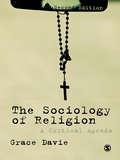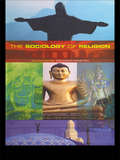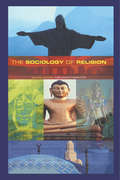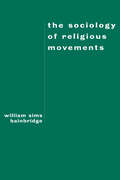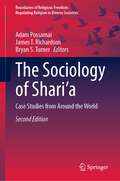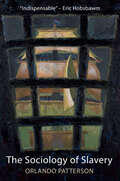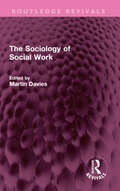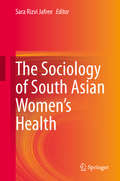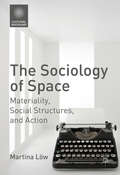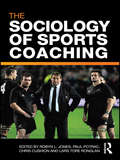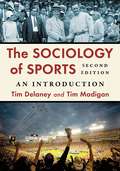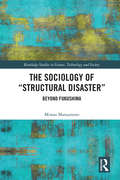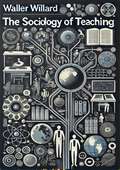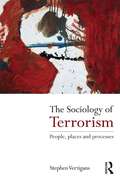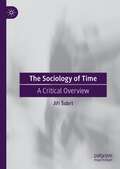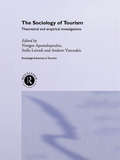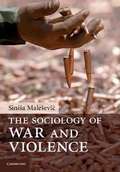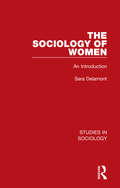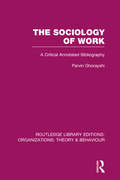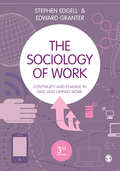- Table View
- List View
The Sociology of Religion: A Critical Agenda (Theology And Religion In Interdisciplinary Perspective Series In Association With The Bsa Sociology Of Religion Study Group Ser.)
by Dr Grace DavieWhy is religion still important? Can we be fully modern and fully religious? In this new edition, Davie follows up her discussion of the meaning of religion in modern society and considers how best to research and understand this relationship. Exploring the rapid movements within the sociology of religion today, this revised and updated book: * Describes the origins of the sociology of religion * Demystifies secularization as a process and a theory * Relates religion to modern social theory * Unpacks the meaning of religion in relation to modernity and globalization * Grasps the methodological challenges in the field * Provides a comparative perspective for religions in the west * Introduces questions of minorities and margins * Sets out a critical agenda for debate and research The Sociology of Religion has already proved itself as one of the most important titles within the field; this edition will ensure that it remains an indispensable resource for students and researchers alike.
The Sociology of Religion: A Substantive and Transdisciplinary Approach
by Dr George LundskowMost Sociology of Religion texts are decidedly staid and uninteresting, covering "contemporary" developments which are only contemporary only from a disciplinary perspective. They are not contemporary if viewed from the perspective of the religion's practioners (in religious and non-religious settings). The textbooks that attempt to be interesting to undergraduate students often fall short because they either try to cover too much in an encyclopedic format, or sacrifice a sociological perspective for a personal one. Many use real-life examples only superficially to illustrate concepts. Lundskow's approach is the opposite—students will learn the facts of religion in its great diversity, all the most interesting and compelling beliefs and practices, and then learn relevant concepts that can be used to explain empirical observations. The book thus follows the logic of actual research—investigate and then analyze—rather than approaching concepts with no real bearing on how religion is experienced in society. This approach, using provocative examples and with an eye toward the historical and theoretical, not to mention global experience of religion, will make this book a success in the classroom. The author envisions a substantive approach that examines religion as it actually exists in all its forms, including belief, ritual, daily living, identity, institutions, social movements, social control, and social change. Within these broad categories, the book will devote particular chapters to important historical moments and movements, leaders, and various individual religions that have shaped the contemporary form and effect of religion in the world today.
The Sociology of Religion: An Introduction to Theoretical and Comparative Perspectives
by Malcolm B. HamiltonThe Sociology of Religion is a comprehensive and wide-ranging introduction to theoretical debates in the sociology of religion, placing these theories in the context of specific religious beliefs and practices. Using examples as diverse as primitive religions, Buddhism, millenial movements, the Protestant Ethic, secularisation, cults and the new religious movements, Malcolm Hamilton demonstrates the multiplicity of religious traditions and enables readers to place their own experiences in a wider context. He draws on both historical and anthropological perspectives in his examination of religious practices and outlines the work of major sociological theorists including Marx, Durkheim, Malinowski and other Functionalists, Frazer and Weber in the examination of world religion, bringing these theories up-to-date. The significance of each theoretical perspective is illustrated by chapters on particular beliefs and practices.
The Sociology of Religion: Theoretical and Comparative Perspectives
by Malcolm B. HamiltonThis clear introduction to the sociology of religion combines a discussion of key theorists with a modern emphasis on the diversity of religious beliefs and practices. Malcolm Hamilton's expanded second edition brings the discussion fully up-to-date, and extends its material on secularization and religious sects, giving a broad comparative view. Drawing on the insights of history, anthropology and sociology, he surveys classic and contemporary theory to give a full picture of the variety and scope of theoretical perspectives.
The Sociology of Religious Movements
by William Sims BainbridgeExplaining how religion and society transform each other, this book explores such movements as Holiness, Adventism, religious communes, Satanism, New Age and democratization. The Sociology of Religious Movements is the culmination of work begun in The Future of Religion (the 1986 award winner of the Society for the Scientific Study of Religion) and A Theory of Religion (1993 award winner of the Pacific Sociological Association). Explaining religious schism, innovation, and conversion to show how religion and society transform each other, this book explores such movements as: Holiness, Adventism, religious communes, Children of God, Satanism, New York City Mission Society, New Age, Asian imports, and democratization.
The Sociology of Risk and Gambling Reader
by James F. CosgraveThis reader contributes to the sociology of gambling, and offers a variety of sociological approaches, ranging from classical sociological analyses of gambling to contemporary sociological approaches to risk.
The Sociology of School Organization: Contemporary Sociology of the School (Routledge Library Editions: Sociology of Education #30)
by Ronald KingFirst published in 1983, this volume assembles recent theory on school organization, drawing on a wide range of research, mainly on schools in contemporary Britain but with some illuminating historical and overseas comparisons. It examines elements of organization both within and outside the school, and shows how they vary with the age, sex, ethnicity and social class of pupils, as well as school size and efficiency. It argues how, with understanding, organizational patterns may be changed to respond to new objectives and how they may become more effective and responsive to human needs in schools and classrooms.
The Sociology of Schools (Society Now)
by Karen ChapmanThe sociology of education is concerned not just with the abstract theory but with the day-to-day experiences of pupils and teachers. In this up-to-date account of the main developments in the subject, Karen Chapman shows how education offers a rich and varied field for sociologists, one easily accessible for study.She begins by setting the subject in its historical post-War context. She then goes on to outline comprehensively the subject's theoretical base and anlayses the factors that influence educational change. Specific chapters deal with the topical subjects of educational under-achievement, gender, race and the trend towards a vocational element in curriculum.
The Sociology of Shari'a: Case Studies from around the World
by Bryan S. Turner Adam Possamai James T RichardsonThis edited volume offers a collection of papers that present a comparative analysis of the development of Shari'a in countries with Muslim minorities, such as America, Australia, Germany, and Italy, as well as countries with Muslim majorities, such as Malaysia, Bangladesh, Turkey, and Tunisia. The Sociology of Shari'a provides a global analysis of these important legal transformations and analyzesthe topic from a sociological perspective. It explores examples of non-Western countries that have a Muslim minority in their populations, including South Africa, China, Singapore, and the Philippines. In addition, the third part of the book includes case studies that explore some ground-breaking theories on the sociology of Shari'a, such as the application of Black, Chambliss, and Eisenstein's sociological perspectives.
The Sociology of Shari’a: Case Studies from Around the World (Boundaries of Religious Freedom: Regulating Religion in Diverse Societies)
by Bryan S. Turner James T. Richardson Adam PossamaiThis edited collection focuses on the comparative analysis of the application of Shari’a in countries with Muslim minorities (e.g. USA, Australia, Germany and Italy) and majorities (e.g. Malaysia, Bangladesh, Turkey, and Morocco). Most chapters in this new edition have been revised and the book as a whole has been updated to give even more international coverage. This text provides a sociological and global analysis of a phenomenon that goes beyond the ‘West versus the rest’ dichotomy. One example of this is how included are case studies in Muslim minority countries not exclusively located in the West. Although the contributors of this book come from various disciplines such as law, anthropology, and sociology, this volume has a strong sociological focus on the analysis of Shari’a. The final part of the book indeed draws out from all the case studies explored some ground-breaking theories on the sociology of Shari’a such as the application of Black, Chambliss and Eisenstein’s sociological theories. This text appeals to students and researchers working in the sociology of religion.
The Sociology of Slavery: Black Society in Jamaica, 1655-1838
by Orlando PattersonOrlando Patterson’s classic study of slavery in Jamaica reveals slavery for what it was: a highly repressive and destructive system of human exploitation, which disregarded and distorted almost all of the basic prerequisites of normal social life. What distinguishes Patterson's account is his detailed description of the lives and culture of slaves under this repressive regime. He analyses the conditions of slave life and work on the plantations, the psychological life of slaves and the patterns and meanings of life and death. He shows that the real-life situation of slaves and enslavers involved a complete breakdown of all major social institutions, including the family, gender relations, religion, trust and morality. And yet, despite the repressiveness and protracted genocide of the regime, slaves maintained some space of their own, and their forced adjustment to white norms did not mean that they accepted them. Slave culture was characterized by a persistent sense of resentment and injustice, which underpinned the day-to-day resistance and large-scale rebellions that were a constant feature of slave society, the last and greatest of which partly accounts for its abolition. This second edition includes a new introduction by Orlando Patterson, which explains the origins of the book, appraises subsequent works on Jamaican slavery, and reflects on its enduring relevance. Widely recognized as a foundational work on the social institution of slavery, this book is an essential text for anyone interested in the role of slavery in shaping the modern world.
The Sociology of Social Work (Routledge Revivals)
by Martin DaviesHow do sociologists explain the role and function of social work in society? How has sociological knowledge been used, adapted and misused by social workers? Originally published in 1991, The Sociology of Social Work includes chapters on sociological theory and social work, child protection, community care, probation interviews, family therapy, residential care, race, and knowledge and power.
The Sociology of South Asian Women’s Health
by Sara Rizvi JafreeThis contributed volume is the first-known collection of essays that brings together scholarly review, critiques, and primary and secondary data to assess how sociocultural factors influence health behavior in South Asian women. The essays are authored by working scholars or healthcare practitioners from Bangladesh, India, and Pakistan. In the chapters, the contributors acknowledge social, economic, and environmental factors to recommend improved interventions and health policy for women of the region.Studies on South Asian women’s health have targeted clinical evidence, with less attention on social and environmental factors driving health recovery and health outcomes. The South Asian region, more than any other part of the world, is driven by traditional and cultural forces that are possibly the most significant factors determining a woman’s health awareness and her rights to adopt healthy behavior or pursue health recovery. Women of the region share a common culture and political history, and there are benefits to understanding their problems collectively in order to design joint improvements in health policy for women.Salient, but neglected, socio-political areas that influence health behavior and health outcomes in women of the region are covered in the chapters including:Oral Narrations of Social Rejection Suffered by South Asian Women with Irreversible Health Conditions Women’s Role in Decision-Making for Health Care in South Asia Poverty, Health Coverage, and Credit Opportunities for South Asian WomenRefugee, Displaced, and Climate-Affected Women of South Asia and Their Health ChallengesThe Political Sociology of South Asian Women’s HealthThe Sociology of South Asian Women’s Health is a useful resource for students, researchers, and academicians, especially those interested in public health, gender, social policy, and occupational management, as well as healthcare practitioners, administrators, health and public policy-makers, government officers, and scholars of South Asian studies.
The Sociology of Space: Materiality, Social Structures, and Action (Cultural Sociology)
by Martina LöwIn this book, the author develops a relational concept of space that encompasses social structure, the material world of objects and bodies, and the symbolic dimension of the social world. Löw’s guiding principle is the assumption that space emerges in the interplay between objects, structures and actions. Based on a critical discussion of classic theories of space, Löw develops a new dynamic theory of space that accounts for the relational context in which space is constituted. This innovative view on the interdependency of material, social, and symbolic dimensions of space also permits a new perspective on architecture and urban development.
The Sociology of Sports Coaching
by Robyn L. JonesSports coaching is a social activity. At its heart lies a complex interaction between coach and athlete played out within the context of sport, itself a socio-culturally defined set of practices. In this ground-breaking book, leading international coaching scholars and coaches argue that an understanding of sociology and social theory can help us better grasp the interactive nature of coaching and consequently assist in demystifying the mythical ‘art’ of the activity. The Sociology of Sports Coaching establishes an alternative conceptual framework from which to explore sports coaching. It firstly introduces the work of key social theorists, such as Foucault, Goffman and Bourdieu among others, before highlighting the principal themes that link the study of sociology and sports coaching, such as power, interaction, and knowledge and learning. The book also outlines and develops the connections between theory and practice by placing the work of each selected social theorist alongside contemporary views on that work from a current practicing coach. This is the first book to present a critical sociological perspective of sports coaching and, as such, it represents an important step forward in the professionalization of the discipline. It is essential reading for any serious student of sports coaching or the sociology of sport, and for any reflective practitioner looking to become a better coach.
The Sociology of Sports: An Introduction
by Tim Delaney Tim MadiganIn its second edition, this book takes a fresh approach to the study of sports, presenting key concepts such as socialization, economics, gender, race, ethnicity, religion, politics, the media and the role of sports in society. The authors offer a critical examination but highlight also the many positive aspects of sports. Each chapter concludes with a popular culture section, showing how films, television, video games, music and short stories have contributed to our understanding of sports' significance to our lives. <p><p>Other features include up-to-date information--such as statistics on player and owner salaries--and a look at recent controversies in sports, such as performance-enhancing drugs, domestic violence, online gambling and the growing concern over concussions and post-career health problems. The value of sports for people with physical disabilities and special needs is discussed, as well as the development of sports studies programs and the continuing importance of "sportsmanship." The final chapter explores how social media, as well as new forms of virtual reality and the prevalence of video gaming, are reshaping the concept of what constitutes a sport.
The Sociology of Structural Disaster: Beyond Fukushima (Routledge Studies in Science, Technology and Society)
by Miwao MatsumotoHow and why did credible scientists, engineers, government officials, journalists, and others collectively give rise to a drastic failure to control the threat to the population of the Fukushima disaster? Why was there no effort on the part of inter-organizational networks, well-coordinated in the nuclear village, to prevent the risks from turning into a disaster? This book answers these questions by formulating the concept of "structural disaster" afresh. First, the book presents the path-dependent development of structural disaster through a sociological reformulation of path-dependent mechanisms not only in the context of nuclear energy but also in the context of renewable energy. Secondly, it traces the origins of structural disaster to a secret accident involving standardized military technology immediately before World War II, and opportunistic utilization of the Great Kanto Earthquake of 1923, thus reconstructing the development of structural disaster within a long-term historical perspective. Maintaining distance from conflicts of interest and cultural essentialisms, this book highlights configurations and mechanisms of structural disasters that are far more persistent, more universal, but less visible, and that have turned risk into suffering. The book seeks to cast light on an important new horizon of the science-technology-society interface in the sociology of science and technology, science and technology studies, the sociology of disaster, the social history of the military-industrial-university complex, and beyond.
The Sociology of Teaching
by Waller Willard"The Sociology of Teaching" by Waller Willard is a groundbreaking exploration of the complex social dynamics that shape the educational environment. Willard, a pioneering sociologist, provides a comprehensive analysis of the interactions between teachers, students, and the institutional structures within which they operate. This seminal work delves into the sociological aspects of teaching, offering profound insights into the roles, relationships, and cultural norms that influence the educational process.Willard's detailed examination covers various dimensions of the teaching profession, including the authority and social status of teachers, the impact of organizational culture on educational practices, and the intricate socialization processes that occur within schools. He explores the ways in which teachers' identities and behaviors are shaped by their social contexts, as well as the expectations and pressures imposed by society and educational institutions.One of the key contributions of "The Sociology of Teaching" is its analysis of the teacher-student relationship. Willard investigates how power dynamics, communication patterns, and social expectations influence interactions in the classroom. He highlights the reciprocal nature of this relationship, showing how both teachers and students affect and are affected by each other's behaviors and attitudes.Willard also addresses the broader societal implications of education, discussing how schools serve as agents of socialization, transmit cultural values, and contribute to social stratification. His work underscores the importance of understanding the social context of teaching to develop more effective educational policies and practices."The Sociology of Teaching" is an essential read for educators, sociologists, and policymakers interested in the intersection of education and society. Willard's rigorous research and insightful analysis provide a valuable framework for examining the social dimensions of teaching, making this book a timeless resource for those seeking to understand and improve the educational system.
The Sociology of Terrorism: People, Places and Processes
by Stephen VertigansThis is the first terrorism textbook based on sociological research. It adopts an innovative framework that draws together historical and modern, local and global, and social processes for a range of individuals, groups and societies. Individual behaviour and dispositions are embedded within these broader relationships and activities, allowing a more holistic account of terrorism to emerge. In addition, the shifting forms of identification and interwoven attitudes to political violence are discussed in order to explain the emergence, continuation, and end of ‘terrorist’ careers. The book draws on examples from across the discursive spectrum, including religious, ‘red’ and ‘black’ racialist, nationalist, and trans-national. It also spans territories as diverse as Chechnya, Germany, Italy, Japan, Northern Ireland, Pakistan, Palestine, Saudi Arabia, South America, the UK, and the US.
The Sociology of Time: A Critical Overview
by Jiří ŠubrtIn a critical, comparative study of the sociological literature, this book explores the term “time,” and the various interconnections between time and a broad cluster of topics that create a conceptual labyrinth. Various understandings of time manifest themselves in the context of many individual social problems—there is no single vision in sociology of how to grasp time and address within social theory. This book, therefore, attempts to define an approach to the concept of time and its associated terms (duration, temporality, acceleration, compression, temporal structures, change, historical consciousness, and others). The volume is guided by a critical engagement with three main questions: a) the formation of human understanding of time; b) the functioning of temporal structures at different levels of social reality; c) the role and place of time in general sociological theory.
The Sociology of Tourism: Theoretical and Empirical Investigations (Routledge Advances in Tourism #Vol. 1)
by Yiorgos Apostolopoulos Stella Leivadi Andrew YiannakisThe rapid expansion of the tourism industry has provided many economic benefits and affected every facet of contemporary societies including employment, government revenue and cultural manifestations. However, tourism can also be considered a problematic phenomenon, promoting dependency, underdevelopment and adverse sociocultural effects, especially for developing countries. This pioneering work provides a comprehensive review of these complex tourism issues from a sociological perspective. Various theoretical and empirical approaches are introduced and the following issues are discussed: * identifiable and stable forms of touristic behaviour and roles* social divisions within tourism* the interdependence of tourism and social institutions* the effects of transnational tourism and commodification on the ecosystem.Featuring international contributions from nine different countries, this book brings together the most noted theoretical and empirical studies and enriches them with diverse experiences and perspectives.
The Sociology of War and Violence
by Sinisa MalesevicWar is a highly complex and dynamic form of social conflict. This new book demonstrates the importance of using sociological tools to understand the changing character of war and organised violence. The author offers an original analysis of the historical and contemporary impact that coercion and warfare have on the transformation of social life, and vice versa. Although war and violence were decisive components in the formation of modernity most analyses tend to shy away from the sociological study of the gory origins of contemporary social life. In contrast, this book brings the study of organised violence to the fore by providing a wide-ranging sociological analysis that links classical and contemporary theories with specific historical and geographical contexts. Topics covered include violence before modernity, warfare in the modern age, nationalism and war, war propaganda, battlefield solidarity, war and social stratification, gender and organised violence, and the new wars debate.
The Sociology of Women: An Introduction (Studies in Sociology)
by Sara DelamontOriginally published in 1980 The Sociology of Women: An Introduction aimed to provide a sociological, biographically organised portrait of women written from a feminist perspective. It was the first self-contained analytical textbook treatment to present an account of the situation of women in modern Britain that was informed by sociological research. At the same time, it remained a straightforward and elementary text in the sense that it assumed no previous knowledge and is written throughout with the beginning student in mind; it provided a lively, thorough and realistic introduction to a range of sociological issues and problems; it is abundantly illustrated by examples from research findings and views women always in the context of the wider society around them; nor does it shirk controversial questions. The book opens with a short chapter on sex and gender, then traces women’s lives as they grow from childhood through to old age. There are chapters on childhood, adolescence and early adulthood in the first part of the book, which deals principally with the home, the school and friendship patterns. In part two the focus shifts to the adult lives of women. The chapters here are on work, illness and deviance; on class and community; on politics, leisure and religion; and on motherhood and old age. An important feature of the book will be the extensive guidance it provides on further reading and the inclusion of a full bibliography of material on women’s lives.
The Sociology of Work: A Critical Annotated Bibliography (Routledge Library Editions: Organizations)
by Parvin GhorayshiThis reference volume reflects the changing world of work. It includes research on the various dimensions of work, such as the structure of the labour force, labour market segmentation, technology, employment/unemployment, trade unions, and industrial democracy. This book provides an integrated view of the various dimensions of work, its distinguishing characteristics and issues both peculiar, as well as common to industrialized countries. By adopting an interdisciplinary and interactional perspective, this volume provides the scholar and the lay reader with a range of approaches and debates that have made a significant contribution toward understanding the changing nature of work and its social impact.
The Sociology of Work: Continuity and Change in Paid and Unpaid Work
by Professor Stephen Edgell Dr. Edward Granter&‘Definitive, critical and engaging, this is a superb introduction to the sociology of work.&’ Leo McCann, Professor of Management, University of York Now in a fully updated third edition, The Sociology of Work draws on the work of classic and contemporary theorists, to provide readers with a thorough exploration of all aspects of work and employment, including paid and unpaid work, standard and non-standard employment, and unemployment. The new edition includes: Two new chapters on &“Work, Skill and the Labour Process&” and &“Managing Culture at Work&”. Expanded coverage of the rise and decline of trade unions; emotional labour, misbehaviour, and resistance at work. Further discussion of the gig economy and precarious work; automation and the end of work; globalization and human rights. For Sociology and Business students, taking modules in work, employment and society.
